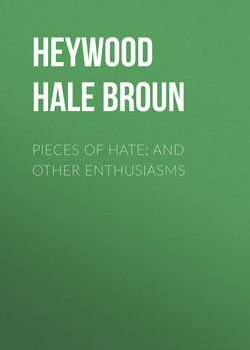Читать книгу Pieces of Hate; And Other Enthusiasms - Heywood Hale Broun - Страница 4
III
PRIVATE OWNERSHIP OF OFFSPRING
ОглавлениеFannie Hurst gurgles with joy over the fact that her heroine in "Star Dust" is able to look over the whole tray of babies which is brought to her in the hospital and pick out her own. Miss Hurst attributes Lily's feat to "her mother instinct." A friend of ours, more practically minded than the novelist, suggests that she might have been aided by the fact that hospitals invariably place an identification tag around the neck of each child. For our part we have never been able to understand the fear of some parents about babies getting mixed up in the hospital. What difference does it make so long as you get a good one? Another's may be better than your own and Lily, with a whole tray from which to choose, should not have made an instinctive clutch immediately for her own. It would have been rational for the lady in the story to have looked at them all before coming to any decision.
Of course, to tell the truth, there isn't much choice in the little ones. They need much more than necklaces with names on them to be persons. There really ought to be some system whereby small children after being born could be kept in the shop for a considerable period, like puppies, and not turned over to parents or guardians until in a condition more disciplined than usual. None of them amounts to much during the first year. We can't see, for the life of us, why your own should be any more interesting or precious to you during this time than the child of anybody else.
After two, of course, they are persons, but a parent must have a good deal of imagination if he can see much of himself in a child. Oh, yes, a nose or the eyes or the color of the hair or something like that, but the world is full of snub noses and brown eyes. To us it never seemed much more than a coincidence. And if it were something more, what of it? How can a man work up any inspiring sentimental gratification over the fact that after he is gone his nose will persist in the world? The hope of immortality through offspring offers no solace to us. The joys of being an ancestor are exaggerated.
Mind you, we do not mean for a moment to cry down the undeniable pleasure which arises from the privilege of being associated with a child of more than two years of age. For a person in rugged health who is not particularly dressed up and does not want to write a letter or read the newspaper, we can imagine few diversions more enjoyable than to have a child turned loose upon him. His own, if you wish, but only in the sense that it is the one to which he has become accustomed. The sense of paternity has nothing on earth to do with the fun. Only a person extraordinarily satisfied with himself can derive pleasure if this child in his house is a little person who gives him back nothing but a reflection. You want a new story and not the old one, which wasn't particularly satisfactory in the first place. We want Heywood Broun, 3rd, to start from scratch without having to lug along anything we have left him. As a matter of fact, we like him just as well as if he were no relation at all, because he seems to be a person quite different from what we might have expected. When he says he doesn't want to take a bath we feel abashed and wish we had been a cleaner child, but for the most part we find him leading his own life altogether. When he bends over the Victrola and plays the Siegfried Funeral March over and over again we have no feeling of guilt. We know we can't be blamed for that. He never got it from us.
And again, he is a person utterly strange, and therefore twice as interesting, when we find him standing up to people, us for instance, and saying that he won't do this or that because he doesn't want to. Much sharper than a serpent's tooth is the pleasure of an abject parent who finds himself the father of a stubborn child. If the people from the hospital should suddenly call up to-morrow and say, "We find we've made a mistake. We sent the wrong child to you three years ago, but now we can exchange him and rectify everything," we would say, "No, this one's been around quite a while now and is giving approximate satisfaction, and if you don't mind you can keep the real one."
Plays and novels which picture meetings between fathers and sons parted from birth or before have always seemed singularly unconvincing to us. The old man says "My boy! My boy!" and weeps, and the young man looks him warmly in the eye and says, "There, there." Not a bit like it is our guess. If we had never seen H, 3rd, and had then met him at the end of twenty years, we wouldn't be particularly interested. Strangers always embarrass us. It would not even shock us much to find that they had sent him to Yale or that he brushed his hair straight back or wore spats. There are to us no ties at all just in being a father. A son is distinctly an acquired taste. It's the practice of parenthood that makes you feel that, after all, there may be something in it. And anybody's child will do for practice.
